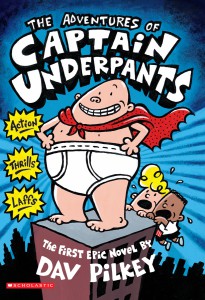What do the Holy Bible, Fifty Shades of Grey, and Captain Underpants have in Common?

It looks like the Bible won’t become the official book of Tennessee, after Gov. Bill Haslam vetoed a bill last Thursday that would have made Christianity’s sacred book the top tome of the Volunteer State. Incidentally, Tennessee has lots of other official things—songs, birds, flowers, and the like. (Did you know that it even has an official gun? That’s right—as of February of this year the Barrett M82/M107, a .50-caliber, semi-automatic rifle, is the state’s favorite firearm.)
Although the Bible won’t be elevated in Tennessee, it did make the most recent top-ten list of challenged books compiled by the American Library Association. In the interest of fighting censorship in public schools and libraries, the ALA’s Office for Intellectual Freedom has been compiling such lists since 1990 and recently released the list of books that received the most challenges in 2015. A challenge is defined as a formal, written complaint submitted by an individual to a school or public library asking that the book be removed. Books are frequently challenged over sexual content, profanity, violence, and depictions of racism. (Although in addition to the sex, E.L. James’s Fifty Shades of Grey was also challenged last year for being “poorly written.”)
What about the Bible? According to James LaRue, director of the Office for Intellectual Freedom (how’s that for a venerable job title?), some people incorrectly think that a school library that carries the Holy Bible is violating the establishment clause. Others may be retaliating for attempts to censor books that endorse liberal positions by complaining about the Bible, and yet others challenge “religious viewpoints” depicted in the Christian holy book, such as passages that condemn homosexuality. While the Holy Bible has been identified as a challenged book before, it’s never broken the top-ten (it was number six in 2015), which is just one more sign that more and more people are questioning organized religion, even America’s favorite.
The ALA’s most challenged book of last year was Looking for Alaska (2005) by John Green, cited for offensive language, sexually explicit content, and for being unsuited to the age group to which it was made available. Number four on the list was Susan Kiklin’s 2014 book, Beyond Magenta: Transgender Teens Speak Out, which offers personal portraits of young transgender or gender-neutral teenagers. At number five, just above the Holy Bible, was a 2004 novel challenged for both profanity and atheism, The Curious Incident of the Dog in the Night-Time by Mark Haddon.
Looking back at the past decade’s worth of lists, Toni Morrison appears frequently, as does Aldous Huxley. Humanistic authors like Jodi Picoult, Alice Walker, and Philip Pullman also show up, and we can applaud them all for exploring dark, provocative, political, or otherwise weighty themes in their books. One selection that made this mother of an eight-year-old boy laugh was the Captain Underpants series by Dav Pilkey, which held the top spot on the challenged books list in 2012 and 2013.
But the value of compiling and publicizing such a list is ultimately to remind us that while everyone has the right to be offended by a book—The Earth, My Butt, and Other Rounds Things, which made the list in 2009, probably wouldn’t bother humanists but its hypothetical variant, The Earth, My Butt, and Other Flat Things likely would—nobody should have the right to prevent others from being offended, enlightened, enraged, inspired, bored, or even embarrassed by one.
